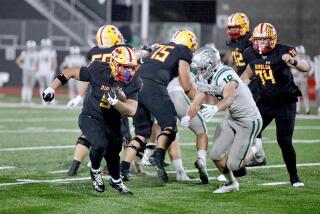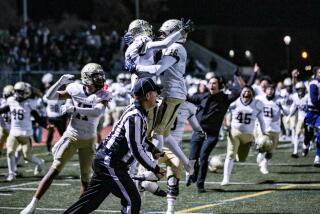Class-First Program
- Share via
HAMILTON, N.Y. — As the charter flight soared into the Florida sky early Saturday evening, Rebecca Chopp looked forward to celebrating with her high-flying football team.
The president of Colgate University had just watched the undefeated squad qualify for the Division I-AA championship game by beating Florida Atlantic, 36-24, at Fort Lauderdale.
But instead of airborne revelry, she found an eerie quiet accompanied by the appearance of textbooks, laptops and note pads.
“I looked forward to the partying,” Chopp said, “but the players were all studying. They didn’t spend any time on the plane hooting and hollering. They got right to work once they got on because they have finals this week. I was amazed.”
Athletics overlapped with academics to an unusual degree this week at Colgate, where final exams were held as the 15-0 football team practiced for tonight’s championship game against Delaware in Chattanooga, Tenn.
No one interviewed on campus -- players, professors or administrators -- expressed any doubt that team members could successfully juggle finals and the finale of a 16-game football season.
With the controversy over the bowl championship series selection system for its Division I-A championship game raging over the last few weeks, cries have risen anew for a playoff system. But the playoff fervor has brought renewed concern that academics would suffer in an extended schedule.
That argument quickly runs out of steam at Colgate, where students have found time for sports practically since the university was chartered in 1819.
“We have a long history of commitment to both in our tradition,” Chopp said.
Among U.S. News and World Report’s top 20 liberal arts colleges in the country, Colgate has an enrollment of 2,750 undergraduates. It is one of the smallest colleges playing a Division I-AA schedule. Colgate’s overall graduation rate is 89%, one of the nation’s highest. The graduation rate of its athletes is 86%, fourth highest in I-AA.
“The students are committed to life here at Colgate,” interim athletic director Don Vaughan said. “They are willing and able to balance their time.”
Their coaches and professors have enabled them to maintain that balance. Football Coach Dick Biddle doesn’t start practice until 4:30 in the afternoon and finishes by 6:30, even though that can mean working in frigid temperatures.
“We do it that late so that there are not many class conflicts,” Biddle said. “Those are the hours when most students are engaged in recreation time anyway.”
And even those hours are not rigid. If a varsity player can’t make practice because of an academic requirement, academics come first.
“If they have a review session or a speaker they need to hear,” Biddle said, “we accommodate them.”
Major college programs have rigid schedules for players to meet with their position coaches. Not Colgate.
“We may have two or three such meetings in a day,” Biddle said. “If we can only get three or four players together at a time because of classes, that’s what we do.”
Even travel schedules revolve around academics. Colgate, which plays in the Patriot League with schools such as Georgetown, Fordham, Bucknell and Lehigh, travels to its away games by bus. Players leave after class on Friday, usually around 4:30, and return home Saturday night by 10 or 11, leaving them Sunday to study.
“Most professors give and take when there is a conflict,” Biddle said, “but we acquiesce to them when we have to.
“But don’t think that football doesn’t have a high priority here. They fire coaches here. You may have more talented kids in Division I, but our players are as well prepared as those in Division I, and we work as hard or harder.”
The proof can be found on pro football rosters. Fifty-eight players have made the leap from Colgate to the NFL or the old AFL, including defensive back Eugene Robinson, fullbacks Marv Hubbard and Mark van Eeghen and safety Mark Murphy.
But most players are like quarterback Chris Brown, who turned his back on the chance to play for Eastern Kentucky or Navy -- the chance for an athletic scholarship -- to go to Colgate, where football is a non-scholarship sport and tuition and other costs total $39,000 a year.
He also moved from Rockledge, Fla., to Hamilton, a town of 2,500, where 18 inches of snow fell Monday.
Why do it?
“A better education. You get more for your money,” said Brown, who has received $30,000 in financial aid.
But it’s not easy. A typical day for him consists of getting up to lift weights and watch football videotape at 6:30 a.m., then a full day of classes, study time, football practice, looking at more tape, a little more study and, finally, his most anticipated move of the day, falling into bed for a few hours of sleep.Yet Brown knows that football players get no slack in the classroom.
“If you are not serious about academics, this is not the place for you,” Brown said. “The professors don’t like to be second to anyone or anything. Nobody misses a class because of football. Nobody.”
Nobody misses much about anybody else on a small campus in a small town such as Hamilton, located 48 miles from Syracuse and a world away from Manhattan. It’s a town that could easily double for Bedford Falls in “It’s a Wonderful Life,” its main street seemingly pulled right out of Disneyland. In the background are the Adirondack Mountains, the area known as Leatherstocking country in honor of frontier novelist James Fenimore Cooper.
“Not only are there not a lot of distractions around here,” Biddle said, “but when there are any that our players might get into, everybody quickly knows about it.”
Colgate’s most noteworthy previous brush with football greatness came in 1932, when the Raiders won all nine of their games by a combined score of 264-0 yet were unexpectedly snubbed by the Rose Bowl.
This week’s challenges are something new, however, because a Colgate football season has never before stretched into finals week.
With only Monday and Tuesday on campus before Wednesday’s flight to Chattanooga, problems were inevitable. If a player and his professor can’t work out a scheduling conflict, that’s where Mark Edwards, director of the school’s office of undergraduate studies, steps in.
Colgate students operate under an honor code and have what is called a “self-scheduled” method for taking tests. That means a player might take his exam anywhere, including the flight to Tennessee or his hotel room once he gets there, as long as he is in the presence of a university-designated proctor.
Edwards was trying to work out details for six players who had a paper due at noon Thursday.”They can turn it in to me, since I’ll be with the team on the road,” Edwards said, “and I can fax it to the professor or mail it.... We don’t want to tell a professor what to do. We just want the same conditions for everybody. The last thing we want is special treatment, but these are special circumstances.”
The process at Colgate is heartily endorsed by Jack Dovidio, dean of the faculty.
“The student can take his final on a bus, a plane or in a dorm,” he said. “It doesn’t matter a whole lot where they take it or when they take it so much as how much they learn.”
The faculty, Dovidio stressed, shares that point of view.
“Even if we have instructors who are not totally devoted to Division I-AA football,” he said, “they are all devoted to the students.”
And while those students may be devoted to their studies, once those finals are out of the way, if Colgate should win tonight, it won’t be quiet on the flight home.
More to Read
Get our high school sports newsletter
Prep Rally is devoted to the SoCal high school sports experience, bringing you scores, stories and a behind-the-scenes look at what makes prep sports so popular.
You may occasionally receive promotional content from the Los Angeles Times.






